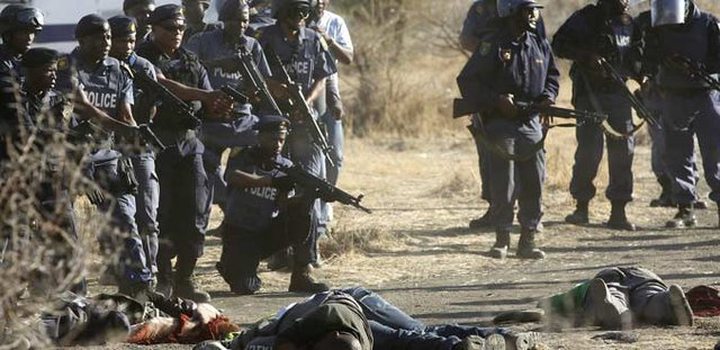Wildcat Strikes Up Stakes In South Africa Labor Game

They feel underpaid, stretched to the limit financially and betrayed by established unions they say are more concerned about ties with politicians and management than workers in the shafts.
But to a few global mining firms, they are part of an overpaid workforce breaking their contracts and in the crosshairs for sacking as costs are cut at marginal shafts in South Africa.
"We no longer want to sit at the table with unions. We've been sabotaged," said Modise, a 30-year-old machine operator at Ikanini, a slum settlement next to an Amplats mine 120 kilometers (75 miles) northwest of Johannesburg.
Since the end of apartheid in 1994, workers have won steady wage increases, but millions of jobless South Africans have missed out on the gains, becoming reliant on the state or relatives for help.
Income inequality in South Africa, already among the world's highest, has grown worse since the former liberation movement African National Congress took over after the end of white-minority rule.
Modise and his 33-year-old colleague Soko speak bitterly about living conditions in Ikanini, where there is no running water or electricity, compared with the prosperity of mine managers who live nearby.
The unrest has also led to job losses; Amplats on Friday sacked 12,000 wildcat strikers, and the next day Atlatsa Resources (ATL.V) dismissed some of the 2,500 workers who went on strike this week at its Bokoni platinum mine.
Each miner supports on average eight to 10 people, often living in abject poverty, according to industry data, so the sackings could cut off income to more than 100,000 people.
Strikers said at the weekend they would stay off the job to press the mining giant Amplats to take the workers back.
The head of the National Union of Mineworkers warned of renewed violence. The labour strife has already led to the death of 49 people since August, including 34 shot dead by police at Lonmin's Marikana platinum on August 16 - the worst security incident in ANC rule.
Held for ransom
In terms of lost working days, the strikes this year are relatively mild, but the unrest is by far the most violent since the end of apartheid.
In 2011, 6.2 million working days were lost to strikes. The number so far this year is less than 2 million working days, according to the Andrew Levy Employment, a labour consultancy.
President Jacob Zuma's ruling ANC and its governing alliance partner, the COSATU labour federation, have kept a lid on strikes by pushing deals for incremental wage raises, thereby guaranteeing a steady labour supply.
The strikes are now beyond the control of the government and COSATU, as fed-up workers hold out for big pay rises, in some cases double or triple their salaries.
In one of the largest blows to the ANC-COSATU labour alliance forged in the struggle to end apartheid, wildcat strikers at Lonmin's Marikana mine reached a deal in September for yearly wage increases as high as 22 percent.
Within hours, workers at nearby platinum mines called for similar deals. In the days that followed, wildcat strikes hit sectors including gold, iron and car manufacturing.
"Marikana is the future of labour relations in South Africa," said Loane Sharp, a labour economist at staffing firm Adcorp.
"The labour strikes are so much more damaging and dangerous, but they still do not seem to be enough for government to learn the lesson that the labour market is in a shambles," he said.
Job Losses
The strikes pushed the rand to 3-1/2 year lows last week and prompted Moody's last month to cut South Africa's government bond rating, citing the government's difficulty in keeping up with economic challenges and widening strikes.
"The South African government has not implemented the kinds of policies to deal with these structural pressures. They are boiling over to the loss of legitimacy for the main, post-apartheid institutions, including the unions and the ANC," said Mark Rosenberg, an Africa analyst at Eurasia Group.
To appease its allies in COSATU, whose 2 million members have been a powerful vote-gathering machine, the ANC has passed a raft of union-friendly labour laws that economists said have eroded competitiveness and driven up costs for employers.
As a result, South Africa ranks worst among 144 countries in terms of employer-labour relations and next to worst in terms of overpaying unproductive workers, according to the World Economic Forum's Global Competitiveness Report.
Nor is anything likely to change this year, with ANC leaders more preoccupied with an internal leadership election at the end of the year than the labour strife, which JP Morgan said is likely to put a dent in 2012 growth.
"South Africa is experiencing a perfect storm as weakening domestic demand coincides with large drags from strikes in mining, downward momentum in manufacturing and political news flow ahead of ANC elections at year-end," it said in a research note.





